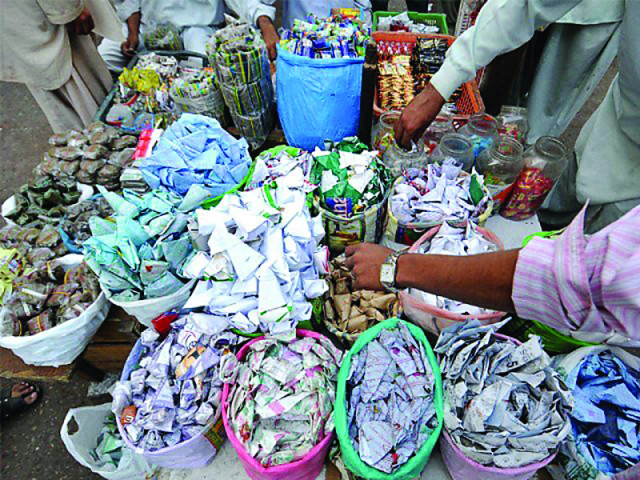My brother, Ali Nawaz Baloch, was 45 when he died from metastatic cancer after initially recovering from oral cancer. He was a senior activist of the Pakistan People’s Party (PPP) in Lyari—a vibrant, politically charged neighborhood in Karachi. Ali was one the few who worked tirelessly to rebuild the PPP’s presence in the area after it had lost ground.
He was deeply respected by the community. In his final days, so many people—men and women—came to visit him at the hospital that we had to ask them to stop. The hallways were always crowded.
Ali’s cancer was caused by Mawa—a smokeless chewing tobacco mixture made of areca nut, tobacco flakes, and slaked lime. It’s cheap, addictive, and deadly. And despite being banned in Pakistan, it’s sold openly on street corners, in markets, and even near schools.
His death was not sudden. It was slow, painful, and cruel. I rushed from the US to Pakistan when I learned he had only days left. By then, he was unconscious, barely able to respond. Months earlier, he had told me, “I haven’t slept in months because of the pain.” His cancer had returned aggressively after initial treatment. Radiation and chemotherapy had given us hope, but it was short-lived. He died on June 13, 2025, leaving behind a grieving family and a community that still hasn’t reckoned with the poison in its midst.
Ali was treated at Aga Khan University Hospital in Karachi, one of the most expensive and well-known hospitals in Pakistan. But our experience there was disheartening. The doctors gave us false hope and rarely explained what to expect or how to manage his pain. Every two days, our family members were back in the emergency room, crying in distress for hours without being attended to.
Most of the care was handled by residents—hardworking, but often unable to provide the answers we desperately needed. It was also frustrating that they used complex medical terminology, which confused family members who spoke little English. I had to ask them—twice—to explain things in plain language. Only then did they pause, explain clearly, and allow us to ask follow-up questions so I could translate for his wife, mother, and other relatives.
I stayed for seven days and barely saw a physician speak to the family. Eventually, they told us to take him home or move him to hospice when Ali was no longer treatable and unconscious. He was on BiPAP and barely breathing. It was heartbreaking to see him like that. Yet the doctors insisted we take him home or to hospice so he could spend his last days with family.
But how can an unconscious patient, struggling to breathe, be sent home or to hospice? To do what—suffer in front of his loved ones? I pleaded with them to at least stabilize him with medication so his wife, mother, and children could see him properly. They didn’t understand: in Lyari, there’s no reliable electricity, and hospice care is a luxury most families can’t afford. I don’t even know if reliable hospice care exists in Karachi. People spend everything they have just to keep their loved ones alive. All I wanted was clear communication—and some cultural understanding. Instead, it felt like they just wanted to get rid of him.
What makes this loss unbearable is that it was preventable. If there had been effective awareness and law enforcement to prevent the sale of Mawa, Gutka, or any form of chewing tobacco, Ali might still be with us. Oral cancer is now among the most common cancers in Pakistan, particularly among men, with over 11,000 new cases reported annually—largely driven by the widespread use of smokeless tobacco products like Mawa and Gutka; studies also show that up to 67.6% of cases are diagnosed at early stages, yet survival outcomes remain uncertain due to limited access to timely care and awareness
Mawa is banned in Karachi. But bans mean little when law enforcement sees them as opportunities for bribes. Vendors continue to sell it openly, and smugglers use luxury sedans and luxury SUVs to transport areca nut past checkpoints. Even when caught, they pay off the police and continue their trade. A source in Lyari told me that after the ban, people rushed to buy ingredients on the black market. The cancer economy didn’t stop—it adapted.
But this isn’t just about corrupt officials. It’s about us—as a society. We throw garbage on the streets and blame the government. We see people chewing Mawa at funerals of those it killed. We look away.
The Pakistan People’s Party, which currently governs Sindh and Karachi, must do more. It must lead public awareness campaigns and hold law enforcement accountable. This time, the PPP lost one of its most dedicated workers—someone who not only loved the party but worked tirelessly to restore its image in Lyari. Many PPP leaders know this. Mayors, ministers, senators, and other officials visited Ali’s family to pay their respects. But respect must be followed by action.
When I was in Pakistan, I saw visitors come to pay respects to my brother—some of them still chewing Mawa. I wanted to scream. If this doesn’t scare them, what will?
We don’t talk enough about cancer in Pakistan. We don’t talk about the agony, the disfigurement, the helplessness. We don’t talk about how it destroys families. Ali was the youngest in our family to die from cancer. Others had suffered too, but his cause was visible, traceable, and avoidable. Ali was the sole breadwinner for a family of four. Women are often expected to be homemakers—that’s another serious issue that deserves its own discussion. When the sole breadwinner dies, the entire family’s future is jeopardized.
We need more than bans. We need public education, community action, and real enforcement. We need to treat Mawa and Gutka not just as health issues, but as moral ones. Because every time someone sells or chews Mawa, they are gambling with lives.
Ali was deeply loved by the community—not just because of his activism, but because he was witty, humorous, and full of life. He had a loud, infectious presence. I once asked him if he ever considered moving to America, like so many others. He laughed and said, “I love Lyari more than America. I would never trade my life here.”
He knew people looked down on Lyari, but he would say, “It feels like home. People love me here, and I love them back.” He also used to joke, “Quetta walas aren’t as fun as Lyari walas.” Ali was tall, healthy, and vibrant. Cancer took all of that. But it shouldn’t take more of us.



COMMENTS (11)
Dear Shezad I read your article and I am so sorry for your loss. I can only pray for your brother Mr Ali and for his family. I felt so sad while I was reading that how Ghutka and Mawa seller trade with their lives and the meanless actions from the law in forcement agencies. Thanks for sharing this untold truth about liyari Hero.
Exactly Mawa should be banned from all over Pakistan because it s becoming the reason of death of many youngsters. We recently lost our beloved member of our family he often used to eat Mawa and suddenly one year before he had a cancer now he s no more with us it was heart-wrenching. It s being a one month he left us too soon.
We can feel your pain we also are sad for your loss. Very informative column indeed the problem with Pakistan is the judiciary police system is not for public so it will go on till the revolutionary changes from top to bottom may be we see that change in our life or may be not. As a responsible citizen you did play your role we appreciate that.
Comments are moderated and generally will be posted if they are on-topic and not abusive.
For more information, please see our Comments FAQ